Remembering Dick Decker, And His Snowmobile Driven Life
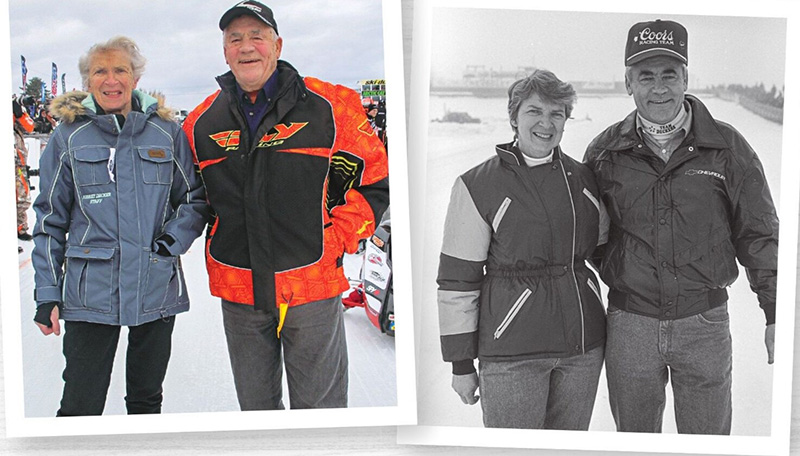
The world of snowmobiling lost an icon today when Richard “Dick” Decker of Eagle River, Wisconsin, died. He was 92.
He lived a life full of energy, passion and enthusiasm. That and his love of the sport that he exhibited in so many ways made him a good friend of mine who I always cherished seeing and who I will miss dearly. Racer, dealership owner, team owner, track owner, tour guide, ambassador, advocate and more, he was a multi-time Hall of Famer in every sense of the word.
In 2019, Dick Decker sat down for an interview with me. Below is that story, in its entirety. Remember to therefore add 5 years onto the ages and timelimes mentioned in this story. Enjoy. And Godspeed, Dick! You truly impacted many, many lives and you will be dearly missed.
A Snowmobiling Life: Dick Decker
The Incredible Journey Of One Of The Sport’s Storied Ambassadors
By John T. Prusak
It all started rather simply: A child’s curiosity, a willing father’s followup and a family that enjoyed active, outdoor pursuits. Who would have thought that a snap decision to buy a product 54 years ago would lead to a family enjoying perhaps one of the most storied runs through snowmobiling history?
Richard “Dick” Decker and his wife, Audrey, may not have invented snowmobiling, but the couple and their sons – Steve, Mike, Allen and Chuck – did practically everything else. From hall-of-fame racing careers to running a dealership and performance shops, their tentacles in the sport run deep.
Taken in sum, perhaps most notable is the fact that the Deckers may have either introduced more people to the sport – or furthered more riders’ love of snowmobiling – than anybody on earth by hosting countless snowmobile tours through the Decker Sno Venture Tours business, and also owning the sport’s most storied grounds in Eagle River, Wisconsin – site of the Eagle River World Championship – for more than 30 years.
But times have changed. The family sold the Derby Track last year, the snowmobile part of the tour business is now focused exclusively on Alaska and, most notable, the family matriarch, Audrey, died this past summer. We caught up with Dick Decker, now 87, to recap the incredible family journey through snowmobiling.
SG: Take us back to the beginning: How did you get introduced to the sport?
Richard Decker: “It was in 1965 – we lived in Marshfield [Wisconsin], and Chuck was walking to school one day and went by this one bicycle dealer that was also a new Ski-Doo snowmobile dealer. There was one sitting there, and he came home all excited and said, ‘Hey Dad, we ought to get one of those snow machines.’ So we went up there and looked at it and, believe-it-or-not, it was the week before Christmas, and that year a new Ski-Doo snowmobile was the family Christmas present.”
SG: What was it about the sport that hooked you right away?
Decker: “We were big snow skiers at the time, so we liked winter very much, and of course you know how kids are – anything that burns gas they liked! That’s how we started. Then in 1966 I went to work for Chrysler Corporation, and they based me out of Duluth, Minnesota, so we moved up to nearby Solon Springs [Wisconsin]. There was a lot of snowmobiling there, so we had one machine, and then we had two machines, and then it wasn’t too much longer and we had three machines [laughs]. We just loved snowmobiling and did it all the time.
“Then in ’67 I got transferred to Minneapolis, and we bought a place out on Lake Minnetonka. I was traveling quite a bit as a district manager, but the kids kept getting more and more serious with their riding – they literally wore those damn sleds out. I would come home and they hadn’t had much gas in them when I left but they’d be all wore out. I finally said, ‘Where in the heck are you guys getting the money to buy that gas?’ Well here they were charging their friends to go snowmobiling!
“By then, racing wasn’t far off. First it was cross-country racing, then oval racing by 1969. By 1970, we were winning lots of races and we were hooked – so much that I decided to resign from Chrysler and devote our lives to snowmobiles. We moved back to Marshfield and bought out the Ski-Doo dealer – the same dealership we bought our first snowmobile from – with the idea it would help the boys’ racing efforts. We then went on to become the winningest race team in snowmobile history.”
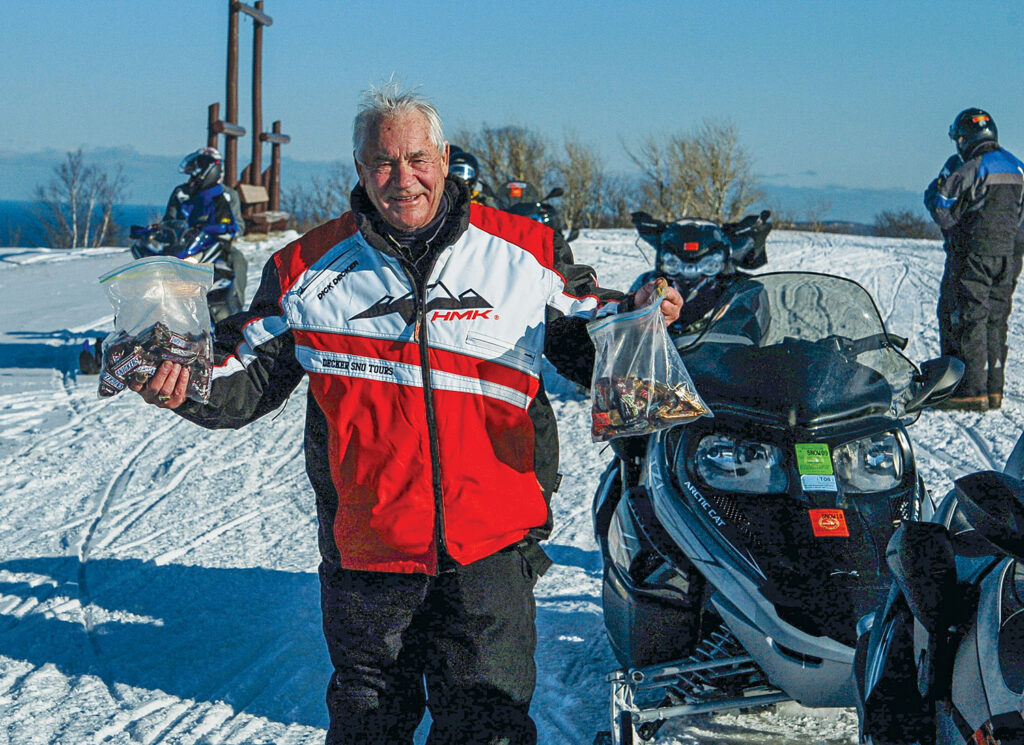
SG: Tell us about Audrey and her racing.
Decker: “When I married her, she couldn’t swim; she drove cars because her dad was a car dealer, but they never had any toys like motorcycles or anything. I was snow skiing, and she decided she had better learn to ski or she’d have to stay home. So she started skiing, and then she started snowmobiling in Solon Springs when we were up there.
“Then she got into racing; there was Powder Puff racing back then, and then she got out of that and had to race against the men. She was just the best woman racer ever. She was nicknamed the ‘First Lady of Snowmobiling.’ She was the first woman inducted into the Snowmobile Racing Hall of Fame – the one now in St. Germain. Then she was inducted to the one that’s now in Eagle River [the International Snowmobile Hall of Fame], and she was inducted a third time with Team Decker in 2018.”
SG: Tell us about the Ski-Doo Team Oasis effort.
Decker: “Ski-Doo called and said, ‘We want to have somebody go around to different areas, and see if it would be possible to promote snowmobiling.’ Ski-Doo gave us credit cards and said, ‘Go wherever you want to go!’ So the first place we went to was Iceland. When we got there we had no sleds since we flew so we talked to a few people and the only sleds they had were a few junky old Russian things used for ice fishing and such. So we rented them and went snowmobiling, and I fell in love with the place. That’s where I really got the idea of doing tours – just to think of bringing people over there so they could have that experience. Then we came back over here and went to Churchill, Manitoba, we went out West with Team Oasis – I did that for five years. Then we got too busy with racing and the dealership.”
SG: How did that lead to you selling the dealership?
Decker: “We did our first [Decker Sno-Venture] tour in 1980. The touring business got so busy, so fast that the dealership had to go. And since the boys had started their performance business [Decker Enterprises] at the same time, there was no one left to carry on the dealership.
“We were the first people that really started doing traveling tours. There were people out in Yellowstone and stuff that would lead [local] tours, but our’s were traveling tours – we’d go out and take tours all over. We started weeklong tours up in Michigan and out in Yellowstone and in Minnesota, and it ended up all over the place: Iceland and Finland and Russia. I think we can say honestly that we’ve snowmobiled in more locations than anybody else. And Audrey, she would drive the truck and I did the guiding, so it worked out pretty good. A lot of experiences.”
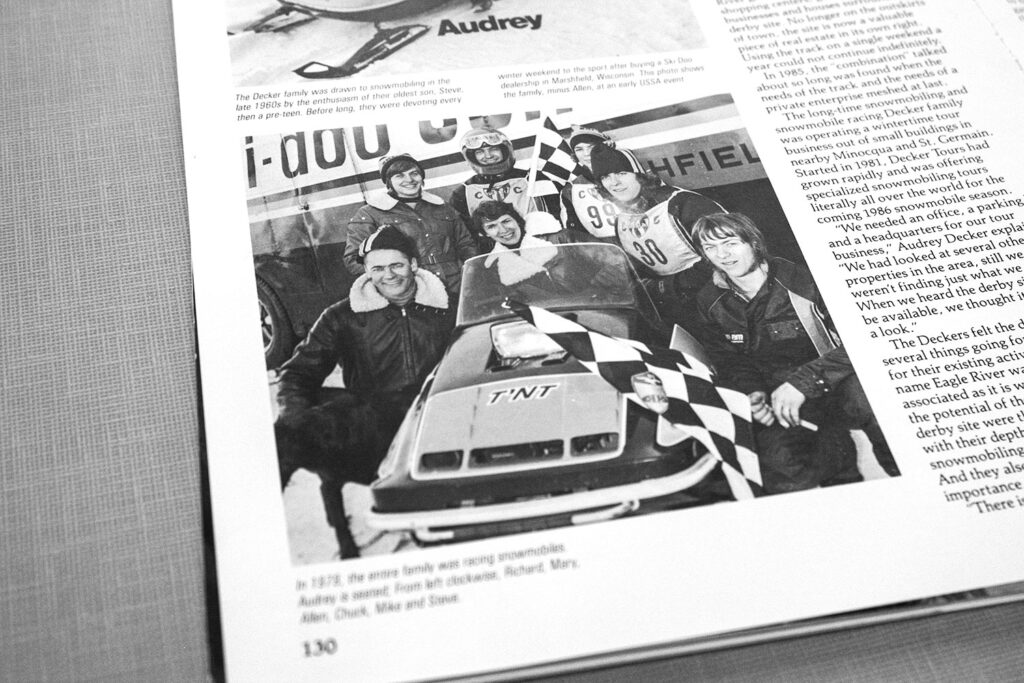
SG: What was the best thing about being in the tour business?
Decker: “Just the people that we attracted and got to meet. We had an 86 percent return rate on the tours – people would come back because we kept doing new and different tours. Of all of the memories, of course we remember the locations and the riding, but just the people that you met and the quality of people – we had everything from farmers to truck drivers to big business people. We met a lot of good people, and still have relationships with many of them. That, and getting people to ride the first time. Honestly, we had people that we had to show where the throttle and the brake were – they didn’t know. But by the time they got out there riding for two or three days or by the end of the week, they were snowmobilers. That’s what Bombardier wanted – we really introduced a lot of people, through both Team Oasis and the tours. It wasn’t too long after that that Arctic Cat called, and then Polaris; at one time, we had sleds from all four manufacturers.”
“We snowmobiled one time from St. Paul, Minnesota, all the way up to Valcourt, Quebec. [Bombardier officials] said, ‘We have an idea, we want you to ride from Minneapolis to Valcourt.’ We said, ‘You’ve got to be kidding!’ But then they bought us three new sleds – those big MXes, the first ones. It was a 2,000-mile trip. We went across the bridge in Sault Ste. Marie – there had never been a snowmobile across, but we got permission to do that. We were carrying a signed flag from President Ronald Reagan to present to the Canadians. When went across that bridge one late afternoon – I’ll never forget it, it was a metal bridge and there were sparks flying and everything!”
SG: Were there instances on tours where you wondered what you had gotten yourself into?
Decker: “Well heck, you get into a lot of situations like that! Even Copper Harbor [Michigan], back in those days when we’d ride up there out of Minocqua [Wisconsin], you’d worry about breakdowns and such, but we always had two machines in the trailer along with the luggage, so we had it down pat. Going around Lake Superior, that’s when we had it really rough. That’s when that part of the country was going to hell [and depopulating] up there and they closed all of the trails and there was no grooming up there or anything. Oh, that was an adventure. I could write a book about that one [laughs].”
SG: Through lord-only-knows how many miles of leading tours, did you personally ever have any notable injuries?
Decker: “I would have liked to have kept track of all of the miles I rode over the 50 years, and with all of those miles, it’s just been damn luck. I mean, I’m not saying that I didn’t go out and roll some over and hit a few trees, but I never got hurt [laughs]. Wait, I can’t say that – I did too. One time up at Copper Harbor at the closed ski hill, I would take the good riders down and back up. Well we’re coming down, and there were some headwalls, and one dropped off pretty fast and I went down below and was videotaping it. Well this guy was coming down and went off of that headwall too fast and lost the machine and, dumb me, I didn’t think it was going too fast so I grabbed the back of it and hung on, thinking I could stop it. It went down the hill and hit a tree, and I hit the back of that sled’s bumper and damn near lost my eye! That was the only time that I personally got hurt. It was pilot error – just sheer stupidity [laughs].”
SG: How did the Eagle River Lions end up selling you the Derby Track?
Decker: “The tour thing was getting so big – we were working out of [nearby] Minocqua and needed a building and more parking areas for the cars of customers that would be snowmobiling for a week. I got an option on some land on Highway 17 in Eagle River – we were going to run the touring business out of there, and the boys were going to move the performance business up there, too. Of course, we liked Eagle River because we raced up there so much, and who wouldn’t want to live up in Eagle River and have a business?! Then the Lions came to me and said, ‘We heard you’re moving up to Eagle River with the tours: Would you be interested in owning the race track?’ I said, ‘I don’t think so, because I think that would be a conflict of interest with the whole family racing.’
“They really wanted out – they were having a lot of problems – so they kept bugging me, and I talked to the kids and other people about it. They said, ‘Look at NASCAR, there’s a lot of big racers like [former racer and current team owner Roger] Penske that have race tracks.’ We talked about it and, believe me, the price was right because they just wanted out, and so we bought the track in 1985. It needed some work, as there wasn’t much there – a couple of trailer houses and that was about it.
“Then I got involved in a dog racing track – about the same time we bought the [Derby] track they were trying to get the pari-mutuel betting legal in Wisconsin. I thought, ‘Why couldn’t we run dogs there in the summer and run the track year-round?’ It wouldn’t work here, though, because it had to be in a location with a lot of people. The guy I was working with on it said, ‘We’ve got to go to Kenosha, that’s going to be the best location,’ but I couldn’t be involved in any other business because of the pari-mutuel betting rules. Chuck was working at the Derby track, so he bought it – he took over the payments like any other business and the debt was his – and me and Audrey moved to Kenosha from 1989 to 1994.
“What bothers me now – Chuck did a lot at that track. When he bought the track he said, ‘I’m going to build the best race facility that there is,’ and he did. It was a good business and he put the money right back into that track. He built the VIP suites and [initiated] the Friday Night Thunder night racing, built the Expo Hall, added the loft to that, had the indoor displayers there, and the offices, and built two new ticket gates, restored the kitchen – he spent a lot of money and time on that facility, and he doesn’t get enough credit for that. Now with [Chuck’s daughter] Natalie racing cars – she’s really climbing the ladder and living in North Carolina – he was spending 90 percent of his time around [auto] racing. So, we had to sell the track; he didn’t have the time to run it and I’m getting too damned old to do it [laughs]. These guys [the new owners] are doing a good job with it, too.”
SG: Chuck owned the track, but after you returned from Kenosha many folks dealt directly with you on track-related issues. What was it like having the family own the sport’s most storied grounds?
Decker: “It was an honor to be able to be in that position, and I don’t think we really realized how big of a thing it was, could be and still is. I thoroughly enjoyed that. I did a lot of that sponsorship stuff – you go to work every day and beg for sponsorships, and I enjoyed that. If I had my pick now, though, I would have liked to have just stayed with the tours – that was obviously more fun than sitting at a desk!”
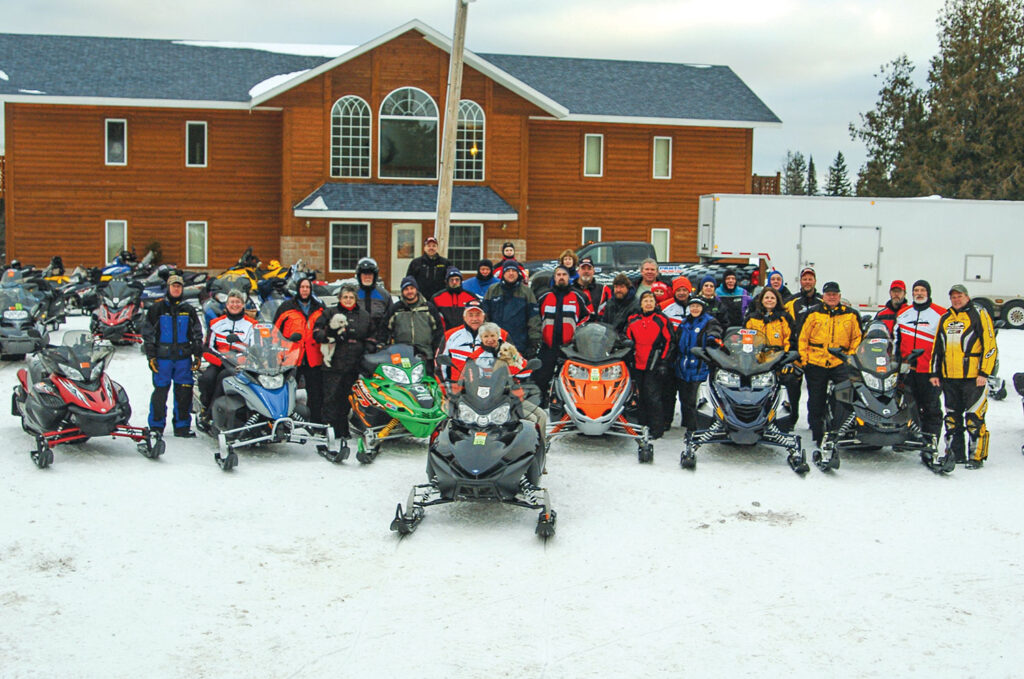
SG: What don’t fans understand about how much work went into putting on the events?
Decker: “That’s exactly why the Lions sold it – they were business people with their own places to run and didn’t have the time to put into it. It needed somebody who could devote the time and have the passion to do it. I don’t think anybody knows how big of a job that it is to run that whole operation, and then the vintage championship weekend thing – right now I enjoy that whole vintage weekend better than the Derby weekend because I like that old iron. We were the first ones to have the big vintage races with a World Championship, and it really did a lot for the industry and did a lot for the Derby. But, it’s a lot of work, and a lot of responsibility.”
SG: How many volunteers or Derby staff play a role in the two weekend events?
Decker: “Between 200 and 250. It’ll vary – some will come and go, some volunteers were there from the get-go, like Ken Pitlik and his guys; their business closes in the winter, and they’re motorheads and snowmobilers, and he’s one of the biggest assets. There are so many people like that. Most of them are local, but it’s amazing the number who come up from Illinois, and that’s their winter vacation. You couldn’t physically or financially do it if you didn’t have volunteers.”
SG: Longtime race fans know about your sons’ racing, and you told us about
Audrey’s career; tell us about your own racing days.
Decker: “I raced stock mainly, but I did have a Mod Stock sled that I raced which was my favorite, and I did very well with that, and had a couple of World Series wins with that. But the one that surprised me and everybody else was a stock 440 Ski-Doo I raced one year. I was the only Ski-Doo in the class, everything else was Arctic Cat, Polaris and Yamahas and such, and I won a lot of races with that sled. They couldn’t believe it – I was comfortable with it and did pretty good. But, I’ve got to tell you a story about that – Audrey also raced that class: We raced against each other. We were at one race and I beat her – I didn’t care who I was going to beat, I beat her and a few others who were friends. But I’ll tell you what, there was not too much friendship right after that because that pissed her off [laughs]! But she beat me more than I ever beat her.”
SG: Many in the snowmobile world were saddened to learn of Audrey’s passing in June. You and Audrey were always so inseparable – how long had you been married?
Decker: “You really want to know? It was 66 years! At 65 years I put a little thing in the local newspaper saying it’s been a good 65 years and it’s been a hell of a ride. I got a lot of comments on that and I tell people that 65 years really wasn’t right. And they say, ‘Really, not that many?’ and I say, ‘No, it’s more like 165 years! And, if you ask Audrey she’ll tell you it’s 265 years!’ [laughs]. We had the best life together, I couldn’t have asked for anything more. We did everything together. She was 21 when we married, I was 22. I’m 87 now, and Audrey was 86 when she passed.”
SG: Looking back to when you bought that first snowmobile, could you have
imagined that your life would center around snowmobiling?
Decker: “Absolutely not, it’s just amazing how all of these things developed and how everything turned out. I never, ever would have dreamt all we were able to accomplish in the snowmobile world as a family. I wouldn’t trade it for anything, the life that we had. There’s been ups and downs, you know, that’s life – but it was an unbelievable experience and I never, ever would have guessed we’d go this far with it all [racing and the various businesses in snowmobiling]; and thank God we survived through it all, and that Audrey was with me every step of the way. Many haven’t been so blessed. It’s just amazing when you think about it all.”

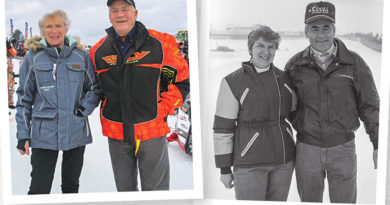
Thanks for putting this out, John. It’s a strange feeling, when your own parents pass on, you look for people in your life that resemble them and folks you respect as much. Dick was certainly that for me. He was a guy you could have fun with but when something of importance or a business decision was on your mind, he was a guy you could confide in. He would look at things from different angles and offer sound advice. I knew he was failing but he kept trudging along, like he would last forever. One aspect of life Dick exemplified to me was not to get weak, don’t complain about your age, surround yourself with good people and “Go out and do it” I will continue to do my best in that regard. Farewell friend, Dave Sarna and the Manawa Snodeo.
God Speed Richard – God has been waiting for you with Audury to do a long ride he needs a great wing man and your the man – will miss you both the snowmobiling industry and the snowmobiling racing will never be the same without u 2
Thanks John for putting this story together so quickly to remind us all what we have just lost in the sport of snowmobiling. If there ever is a Mt Rushmore of snowmobile Icons Dick would certainly have a spot on it (next to Audrey of course). As a DSM for Arctic Cat I covered Northern WI for many years and pretty much had my office at the Best Western Derby Inn (owned by Allen Decker) for 2 nights every other week. I got to spend allot of time with Dick and Audrey and always had to pinch myself to make sure I was not dreaming as they were racing hero’s of mine for so many decades. They treated me like a son and I loved them both dearly for it. The biggest thing for me is how the family kept the Eagle River World Championship Derby going for almost 35 years. He will truly be missed but never ever be forgotten!!
Great story John, thank you. That Snow Goer Escape Factory Tour was great riding with you & the gang. ‘81 Indy 500 Bill Gehn